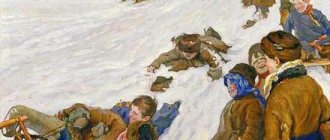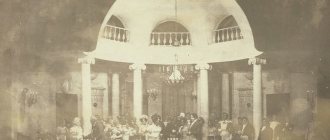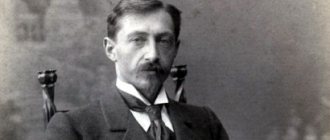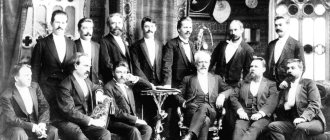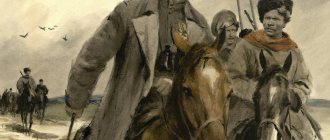- Essays
- On literature
- Lermontov
- The theme of freedom in Lermontov's lyrics
The theme of freedom is very important for Lermontov. His own character is reflected in his creativity.
Mikhail Yuryevich speaks about freedom in different verses; it is difficult to divide his work into “about freedom” and “about something else.” However, you can find several poems specifically about freedom.
Lermontov often talks about the free Slavs. For example, that their bells rang only for freedom. Naturally, in those days it was necessary to defend against the yoke. In the poem “Novgorod” the author reproaches the sons of the Slavs for losing their courage.
The theme of freedom also appears in poems about the individual. For example, “Leaf”. Here the plants are animated. The oak leaf was torn off by a storm, and in its free wanderings it withered. He began to ask to see a young tree on the seashore, as if to a girl. But she proudly refused: why does she need this wanderer with his stories? Now, such will has a downside. There is no guarantee that the wanderer will be given shelter.
You feel freedom more clearly if you lack it. Here Lermontov’s “Prisoner” is suffering behind bars. He calls for a horse to be given to him to escape, but in reality the hero of the house is simply lonely.
In the poem “The Neighbor,” the hero turns to a beautiful captive with a request to escape together, comes up with a plan, and compares them to birds in a cage. There is also the poem “The Neighbor”, where the prisoner simply looks at his brother - without much hope of release. Both verses describe in detail the prison with its damp walls, cold, darkness, guards... And the “Captive Knight” from the dungeon sees only death as liberation. And yet, as the author admits, feelings are alive in the chest, the blood boils, there are a lot of thoughts, and they carry any prisoner to freedom. Thoughts cannot be put in prison!
In “Will” the hero is poor and free, he, in fact, has nothing but will. But he communicates with the steppe, with all of nature, even the trees are his brothers. Again, a strange moment in which freedom brings loneliness with it.
This most important theme is evident throughout Lermontov’s work. His heroes are often deprived of it, but, as they say in the poem “M.P. Solomirskaya,” freedom comes, even if the hero is in captivity, comes thanks to a dream.
Essay on the theme of freedom in the works of Lermontov
The theme of freedom occupies one of the main places in Lermontov's lyrics. This is the poem “Mtsyri”, the poems “Prisoner”, “The Lonely Sail Whitens...”, “Clouds”. The poet wants to find freedom and peace.
...A menacing raging sea, the wind roars in the sails, the mast of a lonely boat creaks and bends. Only in the fog does the sail glow like a white spot. Who dared to leave the harbor in such a storm, when other ships were pressing against the pier? What is a lonely wanderer looking for in this raging element? Running towards happiness? Or is he running from happiness? But why?
The weather has improved. And a ray of sunshine appeared. But the lonely sailor doesn't like it. He wants to rush into the storm again. He is calmer there, no one bothers him there, no one bothers him. Apparently, it’s better for him in a storm than on solid ground. How was it necessary to “get” a person that he was ready to wander around the stormy sea on a fragile boat?
After all, in the poem the poet expresses his attitude towards life. It is he who imagines himself tossing about on a stormy sea under this white sail. But it’s better this way than living on a hated land.
A person cannot be deprived of his freedom. Without it, he withers like a flower without life-giving moisture. Here is the beautiful Circassian Bella from the story “Maksim Maksimych”. She was fading and wasting away before our eyes. Maxim Maksimych walked with her and treated her like a daughter. But “pulled out” like a flower from its native land, even with good care and care, it dies.
Just as the highlander boy from the poem “Mtsyri” dies without freedom. Yes, the monks saved him, went out and raised him. But his freedom-loving nature cannot come to terms with the ascetic life in the monastery. There you have to live according to a routine, suppress your instincts and desires.
And Mtsyri grew up in freedom, among wild nature, among the children of the mountains - simple mountaineers who loved freedom more than anything else. So he runs to his small homeland, to his village, to his family, risking his life in the process. It’s better to have a breath of freedom, even if it’s raining, and thunderstorms, and the sun is mercilessly scorching, and you’re surrounded by wild animals, than to sit in the dull four walls of a monastery, but to be well-fed and protected from everything.
Even in the face of death, he does not stop dreaming of freedom. The poor child finally finds such desired freedom, but in another world.
The poem “Prisoner” was written before exile, practically while the poet was under arrest. The theme of freedom also runs through it.
And “Clouds” reveal what Lermontov means by the word “freedom”. This means thinking, dreaming, not depending on the opinions and principles accepted in society.
“I'm looking for freedom and peace. » Lyrics by M. Yu. Lermontov
Mikhail Yuryevich Lermontov worked in a difficult historical period - the era of “timelessness”, which began after the defeat of the Decembrist uprising. At this time, society was hungry for change. These problems were reflected in Lermontov's work. The famous critic V. G. Belinsky wrote that when “for a person everything old is destroyed, but there is nothing new yet,” Lermontov powerfully reflected this “transitional state of the human spirit.”
In Lermontov's lyrics, the concept of “freedom” is closely related to the concept of “loneliness”. Perhaps this is due to the fact that Mikhail Yuryevich lost his mother early and from an early age he felt his own specialness and exclusivity.
The theme of freedom and peace is clearly reflected in the poem “The Prisoner” (1837), written before exile, when Lermontov was under arrest. The entire work is permeated with the suffering of the poet, who is burdened by his imprisonment and loneliness:
But does the author only want to talk about physical lack of freedom? No, imprisonment for Lermontov is also spiritual slavery. The author protests against internal and external confinement. The symbol of freedom in the poem is “good horse”:
The lyrical hero experiences pain because he cannot also be free:
In his later work “Clouds” (1840), the poet reveals to the reader what freedom means in his mind. This is freedom to think, act, dream and fly, independence from public opinion and foundations. The poem is an unusual combination of literary genres such as elegy and romance. As an element of the romance, Lermontov used a melodic three-part structure, characterized by a relatively even intonation in the first stanza, a rise in the questions of the second and a lowering intonation in the answer to them in the third stanza. This is the so-called semantic turning point, going from comparison to opposition.
Clouds are a symbol of freedom in this work. Lermontov identifies himself with them - they rush over the open spaces aimlessly, wherever the wind blows.
In the middle of the work, asking questions to the clouds, the poet lists a number of problems that are most important to him and outlines the situation around himself:
At the end of the poem, Lermontov contrasts himself with the clouds. It is not the wind that drives him, but the rejection of society. He is not a “wanderer”, but an exile:
It was difficult for Lermontov to find his place in modern society. Even among people he felt lonely. The poet's loneliness was not imposed on him by the world, but was chosen by him voluntarily as a natural state of soul.
In his work, Lermontov M.Yu. more than once mentions the longing for a place where he would feel peace. For example, in the poem “Leaf,” an oak leaf seeks shelter:
And then the leaf finds what it was looking for, a heavenly place for itself where it could find peace:
But the plane tree does not need his company, she chases the leaf away:
The leaf remains alone again. It is not difficult to guess that the poet draws a parallel between himself and the leaf. Lermontov also looked for shelter, but never found it.
Poem “I go out alone on the road. “, about which N. Dobrolyubov said: “A masterpiece written in blood,” was written in 1841. In it, all the emotional pain and bitterness reaches its apogee, the work is permeated with Lermontov’s melancholy and sadness. He is lonely, he has no friends and no beloved. The poet feels alone within the universe, the universe:
The poet is tired of bitterness and disappointment, because he could not achieve harmony with the world and himself:
The poet wants to forget and immerse himself in an eternally cloudless and ideal world, in which there is no pain or loneliness:
At the end of his work, Lermontov finds a place in which he is at peace. This is nature, it is there that for the poet all the harmony and fullness of being is concentrated. In his work, he directly says that he wants to merge with her:
Lermontov did not find a person who understood and shared his views. And he turns away from the poet’s contemporary society, finding peace of mind only with nature. Lermontov's lyrics reflected the entire complex spiritual world of the poet, the feeling of his chosenness, which doomed Lermontov to wander.
- Author: M. Yu. Lermontov
- Work: Lyrics by Lermontov
- This essay has been copied 21,808 times
Let us ask ourselves the question: “What is freedom?” Everyone will have their own answer, because every person has a different view of the world. But if you think about it, we are all not free. We are all limited by social boundaries, beyond which we cannot go. But at the same time, we are free, since we have the right to vote, no one limits our communication and freedom of movement. A person can never decide whether he is free or not.
I believe that freedom is something unknown and unfamiliar to us. Only birds soaring in the sky, not limiting themselves in anything, can know what freedom actually is.
Not freedom is the complete opposite. The same thing that each of us knows. Freedom is not our life, our boundaries set by society.
Many writers have raised the topic of freedom. For example, M.Yu. Lermontov in his work “Mtsyri” clearly expresses this idea:
I knew only one power of thought, One - but fiery passion She, like a worm, lived in me, Gnawed my soul and burned it.
That is, by worm Lermontov means thoughts about freedom, that it was gnawing at Mtsyri’s soul.
Also, during his escape, when the main character saw a strange village and could have gone there, but did not. And all because freedom for Mtsyri can only be on his native side.
Based on all this, we can conclude: a person needs freedom, and if he does not receive it, then the thought of freedom gnaws away every second, leaving no opportunity to think about anything else. As a result, the person, or rather the soul, dies. But what could be more important and valuable? Probably nothing. A person can feel freedom only where his home is.
Finally, I draw a laconic conclusion: happiness is a consequence of freedom.
Check out these essays
- Lyrics of Pushkin and Lermontov (composition) by A.S. Pushkin and M.Yu. Lermontov are outstanding poets of the first half of the 19th century. The main type of creativity for both poets is lyricism. In their poems, each of them described many topics, for example, the theme of love of freedom, the theme of the Motherland, nature, love and friendship, the poet and poetry. All of Pushkin’s poems are filled with optimism, faith in the existence of beauty on earth, bright colors in the depiction of nature, and in Mikhail Yuryevich the theme of loneliness can be seen everywhere. Lermontov's hero is lonely, he is trying to find something in a foreign land. What […]
- Poet-prophet in Pushkin and Lermontov: similarities and differences The theme of the poet and poetry worries all poets, since a person needs to understand who he is, what place he occupies in society, what his purpose is. Therefore, in the works of A.S. Pushkin and M.Yu. Lermontov this topic is one of the leading ones. In order to consider the images of the poet in the two great Russian classics, you must first find out how they define the purpose of their work. Pushkin writes in his poem “The Song of the Prophetic Oleg”: The Magi are not afraid of mighty rulers, And they do not need a princely gift; Truthful and [...]
- Features of the depiction of the feeling of love in the lyrics of Pushkin and Lermontov Introduction Love lyrics occupy one of the main places in the works of poets, but the degree of its study is small. There are no monographic works on this topic; it is partially covered in the works of V. Sakharov, Yu.N. Tynyanova, D.E. Maksimov, they talk about it as a necessary component of creativity. Some authors (D.D. Blagoy and others) compare the love theme in the works of several poets at once, characterizing some common features. A. Lukyanov considers the love theme in the lyrics of A.S. Pushkin through the prism [...]
- The fate of the generation of the 30s in Lermontov’s lyrics (essay) “Duma” is one of those poems in which the skeptical and doubting thought of a noble intellectual pours out directly and openly, bypassing plot and visual forms. Skepticism and despair are associated with inactivity and social cowardice, with isolation from the concrete struggle. They appear in eras when high individual consciousness rushes about in search of a worthy life, but does not find it. In such eras, thought becomes torment and the only real force capable of returning a living person […]
- Addressees of Lermontov's love lyrics (essay) 1. Introduction. The poet's personal attitude to the topic. There is not a single poet who does not write about love, although each of them has his own attitude towards this feeling. If for Pushkin love is a creative feeling, a beautiful moment, a “divine gift” that encourages creativity, then for Lermontov it is confusion of the heart, the pain of loss and, ultimately, a skeptical attitude towards love. To love... but who? For a while it’s not worth the effort, But it’s impossible to love forever..., (“Both boring and sad”, 1840) - reflects the lyrical […]
- Man and nature in Lermontov's lyrics (composition) Lermontov's lyrics amaze and delight us with their musicality. He knew how to convey the subtlest states of mind, plastic images and lively conversation in his lyrics. Musicality is felt in every word and intonation. Not every lyricist is given the ability to see and hear the world as subtly as Lermontov was given. Lermontov's descriptions of nature are flexible and understandable. He knew how to spiritualize and enliven nature: the cliff, clouds, pine trees, waves are endowed with human passions, they know the joys of meetings, the bitterness of separations, freedom, […]
- The main motives of Lermontov's lyrics (essay) Mikhail Yuryevich Lermontov lived during the period of government reaction that came after the defeat of the Decembrist uprising. Any progressive thought was persecuted and prohibited. The Russian intelligentsia was deprived of the opportunity to openly oppose the autocracy. Writers and poets were oppressed by the atmosphere of frozen life, stopped time. The authors seemed to be suffocating in a vacuum of lack of freedom. In such a situation, it seemed to Lermontov that the connection of times had disintegrated, and the feeling of being useless to society and the country had become constant. Life […]
- Motifs of freedom and loneliness in Lermontov's lyrics M. Yu. Lermontov lived and worked during the years of the most severe political reaction that set in in Russia after the defeat of the Decembrist uprising. The loss of his mother at an early age and the poet’s very personality accompanied the exacerbation in his consciousness of the tragic imperfection of the world. Throughout his short but fruitful life he was lonely. Lermontov's lyrical hero is a proud, lonely person opposed to the world and society. Lermontov’s lyrics expressed protest against internal and external [...]
- Three days in freedom (an essay based on Lermontov’s poem “Mtsyri”) The poem of 1839 “Mtsyri” is one of the main program works of M. Yu. Lermontov. The problematics of the poem are connected with the central motifs of his work: the theme of freedom and will, the theme of loneliness and exile, the theme of the hero’s merging with the world and nature. The hero of the poem is a powerful personality, opposing the world around him, challenging it. The action takes place in the Caucasus, among the free and powerful Caucasian nature, kindred to the hero’s soul. Mtsyri values freedom most of all and does not accept life “half-heartedly”: Such […]
- Lermontov's poem “The Prophet” (analysis) Arise, prophet, and see, and heed, Be fulfilled by my will, And, going around the seas and lands, Burn the hearts of people with the verb. A. S. Pushkin “The Prophet” Since 1836, the theme of poetry has received a new sound in Lermontov’s work. He creates a whole cycle of poems in which he expresses his poetic credo, his detailed ideological and artistic program. These are “The Dagger” (1838), “The Poet” (1838), “Don’t Trust Yourself” (1839), “Journalist, Reader and Writer” (1840) and, finally, “The Prophet” - one of the latest and [...]
- Comparative characteristics of “Pechorin and Grushnitsky” (table) Pechorin Grushnitsky Origin An aristocrat by birth, Pechorin remains an aristocrat throughout the novel. Grushnitsky is from a simple family. An ordinary cadet, he is very ambitious, and by hook or by crook he strives to become one of the people. Appearance More than once Lermontov focuses attention on the external manifestations of Pechorin’s aristocracy, such as pallor, small brush, “dazzlingly clean linen.” At the same time, Pechorin is not fixated on his own appearance; it is enough for him to look [...]
- Mtsyri - a freedom-loving personality (essay) Literary critics called the poem “Mtsyri” a romantic epic. And this is true, because at the center of the poetic narrative is the freedom-loving personality of the protagonist. Mtsyri is a romantic hero, surrounded by “an aura of chosenness and exclusivity.” He is characterized by extraordinary inner strength and rebelliousness of spirit. This extraordinary personality is naturally adamant and proud. As a child, Mtsyri was tormented by a “painful illness” that made him “weak and flexible, like a reed.” But this is only the external side. Inside he [...]
- Mtsyri as a romantic hero (essay) First of all, the work “Mtsyri” reflects courage and the desire for freedom. The love motive is present in the poem only in a single episode - the meeting of a young Georgian woman and Mtsyri near a mountain stream. However, despite his heartfelt impulse, the hero refuses his own happiness for the sake of freedom and his homeland. Love for the homeland and thirst for freedom become more important for Mtsyri than other life events. Lermontov depicted the image of the monastery in the poem as an image of a prison. The main character perceives the monastery walls, stuffy cells [...]
- Pictures of nature in the poem Mtsyri The plot of M. Yu. Lermontov’s poem “Mtsyri” is simple. This is the story of Mtsyri's short life, the story of his failed attempt to escape from the monastery. Mtsyri’s entire life is told in one small chapter, and all the remaining 24 stanzas are the hero’s monologue about three days spent in freedom and which gave the hero as many impressions as he had not received in many years of monastic life. The “wonderful world” he discovered contrasts sharply with the gloomy world of the monastery. The hero peers so greedily at every picture that opens to him, so carefully [...]
- How does Pechorin relate to the problem of fate? (essay) My life, where are you going from and where? Why is my path so unclear and secret to me? Why do I not know the purpose of labor? Why am I not the master of my desires? Pesso The theme of fate, predestination and freedom of human will is one of the most important aspects of the central problem of personality in “A Hero of Our Time.” It is most directly presented in “The Fatalist,” which, not by chance, ends the novel and serves as a kind of result of the moral and philosophical quest of the hero, and with him the author. Unlike the romantics [...]
- Where is Mtsyri running from and what is he striving for? At the center of M. Yu. Lermontov’s poem “Mtsyri” is the image of a young mountaineer, placed by life in unusual conditions. As a sick and exhausted child, he is captured by a Russian general, and then finds himself within the walls of a monastery, where he is cared for and cured. It seemed to the monks that the boy had gotten used to captivity and that he “wanted to take a monastic vow in the prime of his life.” Mtsyri himself will later say that he “knows only thought, power, one, but fiery passion.” Not understanding Mtsyri’s inner aspirations, the monks assessed their attitude towards [...]
- Whose side is the truth in “The Song about the Tsar...” The historical poem “The Song about Tsar Ivan Vasilyevich, the young guardsman and the daring merchant Kalashnikov” is dedicated to the era of the reign of Ivan the Terrible. The cruel times of the oprichnina are known to us from history. The real hero of the work is not the tsar, but the young merchant Kalashnikov. Arbitrariness and lawlessness were the calling card of the guardsmen. The common people were afraid of them. Noble people avoided communicating with them. Mikhail Yuryevich Lermontov very accurately described the atmosphere of the reign of Ivan the Terrible: The sun does not shine in the sky […]
- Artistic means of creating characters in “The Song about the Tsar...” Mikhail Yuryevich Lermontov is a bright and original poet who created a gallery of unforgettable characters: brave and impetuous, proud and unyielding, after reading about which you remember them for a long time. Such heroes are the characters in M. Yu. Lermontov’s work “Song about Tsar Ivan Vasilyevich, the young guardsman and the daring merchant Kalashnikov”: the strong and indomitable Kiribeevich, the proud and courageous merchant Kalashnikov, the faithful and loving Alena Dmitrievna. One of the most important characteristics of the heroes of “Song about the Merchant […]
- Life and customs of Moscow in the 15th century. in “Song about the Tsar...” The ancient capital of Russia has always attracted the imagination of artists, writers and poets. Even the austere beauty of St. Petersburg could not overshadow the charm that Moscow has always possessed. For Lermontov, this city is filled with the unearthly music of bells, which he compared to Beethoven's overture. Only a soulless person can fail to see this majestic beauty. For Lermontov, Moscow was a source of thoughts, feelings and inspiration. The action of “Song about Tsar Ivan Vasilyevich, the young […]
- Folklore traditions in the “Song about Tsar Ivan Vasilyevich...” While working on the “Song about Tsar Ivan Vasilyevich, the young guardsman and the daring merchant Kalashnikov,” Mikhail Yuryevich Lermontov studied a collection of epics by Kirsha Danilov and other folklore publications. The source of the poem can be considered the historical song “Kastryuk Mastryukovich,” which tells about the heroic struggle of a man from the people against the guardsman Ivan the Terrible. However, Lermontov did not copy folk songs mechanically. His work is permeated with folk poetry. “Song about the merchant Kalashnikov” is […]
Prisoner
Open the prison for me, Give me the radiance of the day, The black-eyed maiden, The black-maned horse! First I will kiss the young beauty sweetly, then I will jump on the horse, and fly to the steppe like the wind.
But the prison window is high, The door is heavy with a lock; Black-eyed is far away, In her magnificent mansion, A good horse in a green field Without a bridle, alone, at will, Gallops cheerfully and playfully, Spreading its tail in the wind.
I am alone - there is no consolation: The walls are bare all around, The ray of the lamp shines dimly With a dying fire; You can only hear: behind the doors, With resounding steps, An unanswered sentry walks in the silence of the night.
*****
